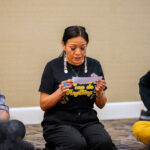As part of the University of Utah’s inaugural Day of Collective Action on March 22, 2022, two 75-minute sessions focused on Indigenizing the U. The first session, on learning, included a moderated panel of speakers who identified as Indigenous and non-Indigenous peoples. The second session engaged in-person participants in a conversation on action—understanding the role of an ally in relation to Indigenizing higher education and committing to allyship strategies and best practices to create an inclusive campus community.
Learning
Speakers for the session on learning included:
- Samantha Eldridge, MPA, Interim Director for the American Indian Resource Center (moderator)
- Cynthia Benally, Ph.D., assistant professor, Education, Culture & Society
- Thomas M Swensen, Ph.D., assistant professor, Ethnic Studies
- Heather Tanana, JD/MPH, research assistant professor, College of Law - Dean
- Connor K Warner, Ph.D., associate professor, Urban Institute for Teacher Education
Key takeaways:
- It is the responsibility of non-Native peoples who build the current systems of oppression to disrupt it.
- The U must make assertive hires of Indigenous Peoples at all staff and faculty levels.
- The Land Acknowledgment is a good start, but moving us beyond these statements toward collective action such as creating a Native Studies Program at the U is an important next step.
- We have 4 tenure-track faculty and a student population that is <0.5% American Indian/Alaska Native. Indigenizing the U also means recruiting and retaining Native students, faculty and staff.
- Indigenous Peoples and Native ideas should be at the center of discussions and initiatives that affect Indigenous communities. Something non-Natives can do is amplify Native voices and follow their lead.
Action
The session focused on action was facilitated by four members of the Office of Health Equity, Diversity, and Inclusion:
- Donna Eldridge, MSW, associate director
- Rawad Farhat, MD, MSPH, program manager
- Jacey Nguyen, BA, program coordinator
- Lia Bermudez, administrative assistant
The facilitators described the purpose of the session as:
- Understanding the role of an ally in relation to Indigenizing higher education.
- Learning allyship strategies and best practices to create an inclusive campus community.
- Sharing opportunities for cross-cultural collaborations and intersectional approaches to EDI efforts within your organization.
Participants were asked to take a survey to determine whether they are currently:
- An Observer. Observers are aware of and are testing their new understanding of allyship.
- An ally. Being an ally is about disrupting oppressive spaces by educating others on the realities and histories of marginalized people.
- An accomplice. An accomplice works within a system and “directly challenges institutionalized/systemic racism, colonization, and white supremacy by blocking or impeding racist people, policies and structures.”
- A co-resister. Being a co-resister is about standing together, as an ensemble, in resistance against oppressive forces and requires constant learning. It is combining theory and practice by establishing relationships and being deeply involved within a community that informs how one listens critically, understands an issue and influences the way they go about disrupting oppressive institutions and systemic systems.
In small groups, participants discussed the specific ways in which they could become stronger Indigenous allies. They were then left with the following ways to practice allyship:
- Hiring Indigenous people to be involved in the creation and ownership of initiatives that are made about them and/or for them.
- Properly crediting Indigenous people for their knowledge and time.
- ‘Passing the mic’ to Indigenous people at events, in the arts, in music, in film, in theatre and in making decisions that affect them.
- Recognizing that Indigenous Peoples have ownership, control, access and possession of their information, knowledge, experiences and stories.
Resources









